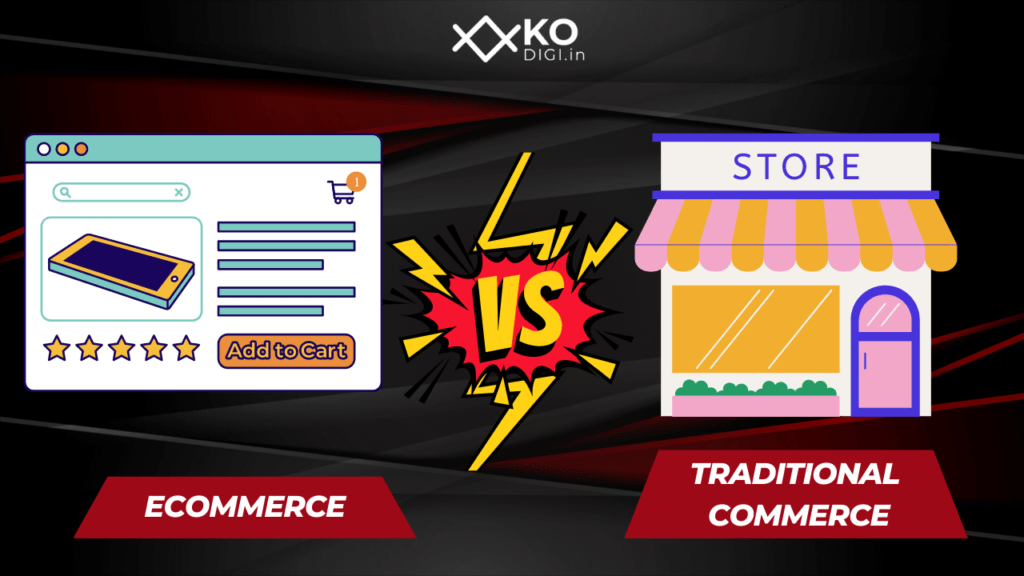In recent years, ecommerce has become a popular way for businesses to sell their products online. Many companies have shifted from traditional retail to ecommerce, and for good reason. There are several benefits of ecommerce over traditional commerce, which we will explore in this article.
Increased Reach and Search Engine Visibility
The opportunity to extend your reach outside a physical place is one of the main benefits of ecommerce. You may sell your goods to anyone, anywhere in the globe, with an internet store. As a result, you can reach more potential clients and thereby boost sales.
Ecommerce websites are frequently geared for search engine presence as well. As a result, your website is more likely to show up at the top of the results page. This could improve the number of visits to your website and ultimately boost sales.
Convenience and Ease of Use
Convenience and simplicity of use are two more advantages of e-commerce for both consumers and merchants. Customers who use an online store can make purchases whenever and wherever they want without going to a physical location. Customers don’t have to travel to a store to make a purchase, which saves time and money.
Furthermore, e-commerce websites frequently feature intuitive click-through navigation that makes it simple for users to find what they’re looking for. Customers’ shopping experiences may be enhanced as a result, increasing the possibility that they will make a purchase.
Lower Costs and Increased Efficiency
E-commerce has the potential to be both more economical and effective for businesses than traditional commerce. Businesses don’t have to pay for rent, utilities, or other costs for online store. Profits can rise and money can be saved as a result.
Additionally, e-commerce enables companies to automate a variety of processes, including order processing and email sending. This can help firms become more efficient and save time. So, they can concentrate on other areas of their commerce operation.
Customized User Experience
Customer happiness and loyalty can be raised by offering them a personalized user experience on e-commerce platforms. Businesses can improve the shopping experience for customers by offering features like tailored shopping carts and personalized product recommendations.
Better Product Description and Comparison of Ecommerce
The capacity to provide thorough product descriptions and comparisons is another advantage of online business. Businesses can provide more details about their items, such as specifications, reviews, and customer ratings, by using an online store. Customers may benefit from this in making wise purchases.
Social Media Integration
Businesses may contact clients where they spend a lot of time by integrating ecommerce websites with social media platforms. Businesses can communicate with clients on social media platforms and market their products there. This is done with the help of social media integration.
Advantages of Ecommerce
- Expanded Reach – Ecommerce enables companies to connect with clients on a global scale. By expanding their clientele beyond the bounds of physical stores.
- 24/7 Availability – Customers can shop whenever it is convenient for them at e-commerce stores. It can be open and accessible at all times.
- Less Overhead -An eCommerce website can be a cost-effective solution for businesses looking to establish an online presence. This is because they don’t have to pay for expenses. By avoiding these costs, businesses can save money and allocate resources toward other areas of their operations. Additionally, eCommerce websites offer flexibility and convenience for customers, allowing them to shop from anywhere at any time. This can increase sales and help businesses reach a wider audience. Operating an ecommerce company typically has fewer overhead costs than operating a physical store.
- Personalization – E-commerce enables companies to gather information on client preferences, which can then be used to tailor the purchasing experience for each customer through targeted advertising and product suggestions.
- Enhanced Efficiency – The automation of numerous product sales procedures, such as inventory control, order processing, and payment processing, makes e-commerce more effective and efficient.
- Improved Sales – Offering clients a simple and convenient option to buy things online, as well as through running specials and discounts, can help businesses raise their sales.
- Better Customer Service – By providing online help, customer reviews, and feedback methods, e-commerce enables businesses to deliver better customer service.
- More Sustainable – Ecommerce has the potential to be more environmentally friendly than conventional brick-and-mortar retailers because it requires less packing and shipping.
Ultimately, e-commerce has many benefits for businesses and is now a crucial part of the contemporary retail environment.
Examples of Popular Ecommerce Platforms in India
E-commerce platforms have grown in India in recent years, serving a variety of product and service categories. Following are a few instances of well-known e-commerce sites in India:
- Amazon.in – The Amazon subsidiary in India is a major player in the world of online shopping. It provides a wide selection of goods, including electronics, apparel, books, and groceries.
- Flipkart.com – One of the top online retailers in India is Flipkart, which sells goods in a variety of categories including furniture, apparel, appliances for the home, and electronics.
- Myntra.com – For clothing, shoes, and accessories for men, women, and children, Myntra is an online fashion and lifestyle retailer.
- Snapdeal.com – An online store called Snapdeal sells a wide range of goods, including electronics, home appliances, clothing, and cosmetics.
- Bigbasket.com – BigBasket is an online grocery store that offers a wide range of groceries, fresh fruits and vegetables, and household essentials.
- Paytm Mall – An online store called Paytm Mall provides goods in a variety of categories, including electronics, clothing, home goods, and groceries. Moreover, it offers an online wallet service for transactions.
- Jabong.com – An extensive selection of clothing, shoes, and accessories for men, women, and children are available at the online fashion and lifestyle retailer Jabong.
- Nykaa.com – Nykaa is an online beauty and wellness store that offers a wide range of makeup, skincare, haircare, and wellness products.
- Urban Ladder – Urban Ladder is an online furniture store that offers a wide range of furniture products for homes and offices.
- Zomato – Zomato is an online food delivery platform that offers a wide range of food options from local restaurants and cafes.
These are just a few examples of the many e-commerce platforms available in India, catering to the diverse needs of consumers.
what is needed for ecommerce website?
To build an eCommerce website, here are some essential components you will need:
- Domain name – Your website’s domain name, such as www.yourbusinessname.com, serves as its address. Choose a domain name that fits your business, is memorable, and is simple to spell.
- Web hosting – A web host keeps the files for your website and provides online access to them. Select a trustworthy web host that provides enough bandwidth, storage, and security.
- eCommerce platform – Choose a platform that will best serve your company’s demands. Several platforms are available, including Shopify, Magento, WooCommerce, and others. These platforms offer crucial functionality including integrated payment gateways, shopping carts, and checkout.
- Payment gateway – To accept payments online, you will require a payment gateway. Choose a payment gateway that accepts a variety of payment options and is reputable and safe.
- Security – Security is an important component of an eCommerce website. You must use SSL certificates, firewalls, and other security measures to guarantee the safety of your website.
- Products and categories – Make a decision regarding the products and categories you wish to sell on your website. Make it simple for customers to find what they’re looking for by organizing them well.
- User interface and design – Designing a user-friendly user interface and picking a design that represents your brand’s identity are important steps. Make sure your website is mobile-friendly and responsive.
- Shipping and logistics – Choosing the delivery alternatives you want to provide and integrating them with your eCommerce platform are steps in the shipping and logistics process. Pick a trustworthy shipping company that offers tracking and delivery updates.
- Marketing – Create a marketing strategy to increase website visitors. To connect with your target audience, use SEO, email marketing, and social media.
Building an eCommerce website requires careful planning and execution. By focusing on these essential components, you can create a robust and effective eCommerce website.
Conclusion
Overall, there are several benefits of ecommerce over traditional commerce. From increased reach and search engine visibility to convenience and ease of use, ecommerce can help businesses increase their sales and efficiency while providing a better shopping experience for customers. By leveraging the advantages of ecommerce, businesses can stay competitive in today’s digital age.




